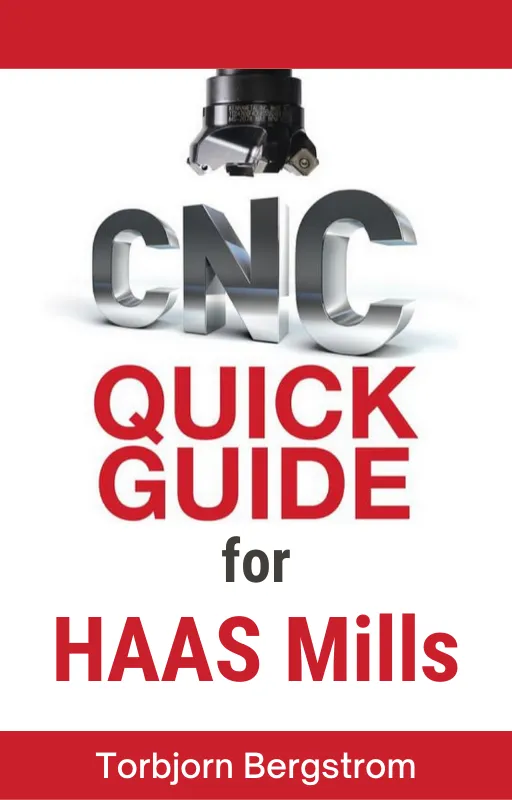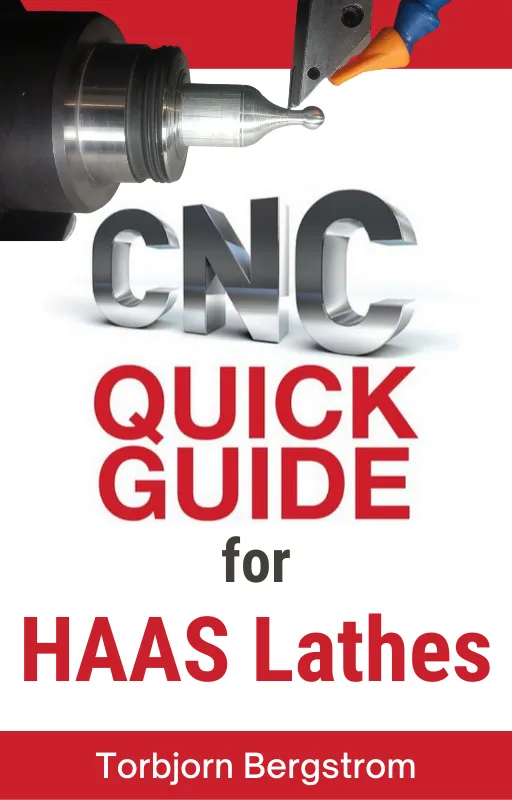Get The CNC Quick Guide

The CNC Quick Guide For Haas Mills
This guide is intended to assist AUTHORIZED USERS in machining facilities equipped with Haas CNC machine tools.
This document does not replace supervised training.
The photographs (and supplemental videos) used in this guide are taken from a variety of vintages of the Haas Controller some may be from controllers newer than the one you are using, and some from an older version. One of the beauties of the Haas controller is that it has been a stable platform from its inception. If you know how to use one vintage controller you can quickly learn another with little or no additional training.
As indicated by the title this book is intended as a quick reference guide and is not a replacement for the operators manual or other training materials available from Haas Automation, available at: http://haascnc.com/

The CNC Quick Guide For Haas Lathes
This guide is intended to assist AUTHORIZED USERS in machining facilities equipped with Haas CNC machine tools.
This document does not replace supervised training.
The photographs (and supplemental videos) used in this guide are taken from a variety of vintages of the Haas Controller some may be from controllers newer than the one you are using, and some from an older version. One of the beauties of the Haas controller is that it has been a stable platform from its inception. If you know how to use one vintage controller you can quickly learn another with little or no additional training.
As indicated by the title this book is intended as a quick reference guide and is not a replacement for the operators manual or other training materials available from Haas Automation, available at:
http://haascnc.com/
The Blogs...
The Art of
Manufacturing
The Professor's Thoughts
The Art of
Manufacturing Wealth

manufacturing the future of the world
manufacturing the future of the world
It takes a village to raise a child. What does it take to raise village? It takes people coming together sharing resources to meet common needs. This is where manufacturing started. It started with the caveman, who was good at making stone tools and not so good at hunting, making tools and trading them to hunters for food. As villages grew into towns, towns into cities, and now into global villages the scaling factor has always been manufacturing. Throughout all of history and prehistory we have been manufacturing the future of the world.
What is the future we are manufacturing now with a department of the US government considering changing the official definition of manufacturing to include “Factoryless Goods Producers” (FGPs) (see It Takes a Factory to Make a Manufacturer.)
The future is what we make of it and if we are not making anything then the future is what someone else makes of it.
Regardless of your opinion on FGPs please take a moment and consider the question. Designating FGPs as manufacturing companies will certainly improve the “manufacturing numbers,” much like recognizing that McDonalds is really doing assembly and packaging not cooking would. Manufacturing in it’s most fundamental sense is the transformation of raw materials into something someone else wants. It’s those processes that transform the raw materials that actually add value and create wealth and when it comes down to it, it’s really all about wealth.
Wealth can be found (dug up out of the ground), wealth can be stolen (usually with an army), and wealth can be created (through manufacturing). Other than those three possibilities the only thing we can do is trade it and move it around. The banking industry, the financial markets, the FGPs, and all of the service industries simply serve to move wealth around. If all a society is doing is moving wealth around without any wealth creation it will naturally become highly stratified with the wealthiest people becoming more and more wealthy and the less wealthy becoming poorer and poorer.
If a society on the other hand is continuously creating new wealth through manufacturing wealth will be unlimited. In a society of unlimited wealth there will be extremely wealthy people but there will also be a strong middle class and there will be real possibilities to move from the poorest classes to the wealthiest classes with hard work and creative thought. Which village would you rather live in, the one with unlimited wealth or the other one?

manufacturing the future of the world
manufacturing the future of the world
It takes a village to raise a child. What does it take to raise village? It takes people coming together sharing resources to meet common needs. This is where manufacturing started. It started with the caveman, who was good at making stone tools and not so good at hunting, making tools and trading them to hunters for food. As villages grew into towns, towns into cities, and now into global villages the scaling factor has always been manufacturing. Throughout all of history and prehistory we have been manufacturing the future of the world.
What is the future we are manufacturing now with a department of the US government considering changing the official definition of manufacturing to include “Factoryless Goods Producers” (FGPs) (see It Takes a Factory to Make a Manufacturer.)
The future is what we make of it and if we are not making anything then the future is what someone else makes of it.
Regardless of your opinion on FGPs please take a moment and consider the question. Designating FGPs as manufacturing companies will certainly improve the “manufacturing numbers,” much like recognizing that McDonalds is really doing assembly and packaging not cooking would. Manufacturing in it’s most fundamental sense is the transformation of raw materials into something someone else wants. It’s those processes that transform the raw materials that actually add value and create wealth and when it comes down to it, it’s really all about wealth.
Wealth can be found (dug up out of the ground), wealth can be stolen (usually with an army), and wealth can be created (through manufacturing). Other than those three possibilities the only thing we can do is trade it and move it around. The banking industry, the financial markets, the FGPs, and all of the service industries simply serve to move wealth around. If all a society is doing is moving wealth around without any wealth creation it will naturally become highly stratified with the wealthiest people becoming more and more wealthy and the less wealthy becoming poorer and poorer.
If a society on the other hand is continuously creating new wealth through manufacturing wealth will be unlimited. In a society of unlimited wealth there will be extremely wealthy people but there will also be a strong middle class and there will be real possibilities to move from the poorest classes to the wealthiest classes with hard work and creative thought. Which village would you rather live in, the one with unlimited wealth or the other one?

manufacturing the future of the world
manufacturing the future of the world
It takes a village to raise a child. What does it take to raise village? It takes people coming together sharing resources to meet common needs. This is where manufacturing started. It started with the caveman, who was good at making stone tools and not so good at hunting, making tools and trading them to hunters for food. As villages grew into towns, towns into cities, and now into global villages the scaling factor has always been manufacturing. Throughout all of history and prehistory we have been manufacturing the future of the world.
What is the future we are manufacturing now with a department of the US government considering changing the official definition of manufacturing to include “Factoryless Goods Producers” (FGPs) (see It Takes a Factory to Make a Manufacturer.)
The future is what we make of it and if we are not making anything then the future is what someone else makes of it.
Regardless of your opinion on FGPs please take a moment and consider the question. Designating FGPs as manufacturing companies will certainly improve the “manufacturing numbers,” much like recognizing that McDonalds is really doing assembly and packaging not cooking would. Manufacturing in it’s most fundamental sense is the transformation of raw materials into something someone else wants. It’s those processes that transform the raw materials that actually add value and create wealth and when it comes down to it, it’s really all about wealth.
Wealth can be found (dug up out of the ground), wealth can be stolen (usually with an army), and wealth can be created (through manufacturing). Other than those three possibilities the only thing we can do is trade it and move it around. The banking industry, the financial markets, the FGPs, and all of the service industries simply serve to move wealth around. If all a society is doing is moving wealth around without any wealth creation it will naturally become highly stratified with the wealthiest people becoming more and more wealthy and the less wealthy becoming poorer and poorer.
If a society on the other hand is continuously creating new wealth through manufacturing wealth will be unlimited. In a society of unlimited wealth there will be extremely wealthy people but there will also be a strong middle class and there will be real possibilities to move from the poorest classes to the wealthiest classes with hard work and creative thought. Which village would you rather live in, the one with unlimited wealth or the other one?
